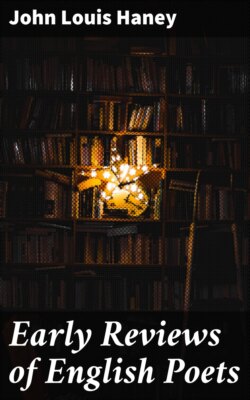Читать книгу Early Reviews of English Poets - John Louis Haney - Страница 7
На сайте Литреса книга снята с продажи.
Thomas Gray
ОглавлениеTable of Contents
ODES. By Mr. Gray. 4to. 1s. Dodsley.
As this publication seems designed for those who have formed their taste by the models of antiquity, the generality of Readers cannot be supposed adequate Judges of its merit; nor will the Poet, it is presumed, be greatly disappointed if he finds them backward in commending a performance not entirely suited to their apprehensions. We cannot, however, without some regret behold those talents so capable of giving pleasure to all, exerted in efforts that, at best, can amuse only the few; we cannot behold this rising Poet seeking fame among the learned, without hinting to him the same advice that Isocrates used to give his Scholars, Study the People. This study it is that has conducted the great Masters of antiquity up to immortality. Pindar himself, of whom our modern Lyrist is an imitator, appears entirely guided by it. He adapted his works exactly to the dispositions of his countrymen. Irregular[,] enthusiastic, and quick in transition—he wrote for a people inconstant, of warm imaginations and exquisite sensibility. He chose the most popular subjects, and all his allusions are to customs well known, in his day, to the meanest person.[F]
His English Imitator wants those advantages. He speaks to a people not easily impressed with new ideas; extremely tenacious of the old; with difficulty warmed; and as slowly cooling again.—How unsuited then to our national character is that species of poetry which rises upon us with unexpected flights! Where we must hastily catch the thought, or it flies from us; and, in short, where the Reader must largely partake of the Poet's enthusiasm, in order to taste his beauties. To carry the parallel a little farther; the Greek Poet wrote in a language the most proper that can be imagined for this species of composition; lofty, harmonious, and never needing rhyme to heighten the numbers. But, for us, several unsuccessful experiments seem to prove that the English cannot have Odes in blank Verse; while, on the other hand, a natural imperfection attends those which are composed in irregular rhymes:—the similar sound often recurring where it is not expected, and not being found where it is, creates no small confusion to the Reader—who, as we have not seldom observed, beginning in all the solemnity of poetic elocution, is by frequent disappointments of the rhyme, at last obliged to drawl out the uncomplying numbers into disagreeable prose.
It is, by no means, our design to detract from the merit of our Author's present attempt: we would only intimate, that an English Poet—one whom the Muse has mark'd for her own, could produce a more luxuriant bloom of flowers, by cultivating such as are natives of the soil, than by endeavouring to force the exotics of another climate: or, to speak without a metaphor, such a genius as Mr. Gray might give greater pleasure, and acquire a larger portion of fame, if, instead of being an imitator, he did justice to his talents, and ventured to be more an original. These two Odes, it must be confessed, breath[e] much of the spirit of Pindar, but then they have caught the seeming obscurity, the sudden transition, and hazardous epithet, of his mighty master; all which, though evidently intended for beauties, will, probably, be regarded as blemishes, by the generality of his Readers. In short, they are in some measure, a representation of what Pindar now appears to be, though perhaps, not what he appeared to the States of Greece, when they rivalled each other in his applause, and when Pan himself was seen dancing to his melody.
In conformity to the antients, these Odes consist of the Strophe, Antistrophe, and Epode, which, in each Ode, are thrice repeated. The Strophes have a correspondent resemblance in their str[u]cture and numbers: and the Antistrophe and Epode also bear the same similitude. The Poet seems, in the first Ode particularly, to design the Epode as a complete air to the Strophe and Antistrophe, which have more the appearance of Recitative. There was a necessity for these divisions among the antients, for they served as directions to the dancer and musician; but we see no reason why they should be continued among the moderns; for, instead of assisting, they will but perplex the Musician, as our music requires a more frequent transition from the Air to the Recitative than could agree with the simplicity of the antients.
The first of these Poems celebrates the Lyric Muse. It seems the most laboured performance of the two, but yet we think its merit is not equal to that of the second. It seems to want that regularity of plan upon which the second is founded; and though it abounds with images that strike, yet, unlike the second, it contains none that are affecting.
In the second Antistrophe the Bard thus marks the progress of Poetry.
